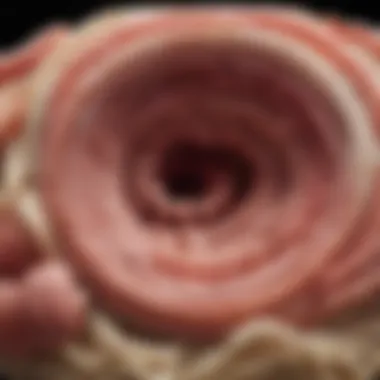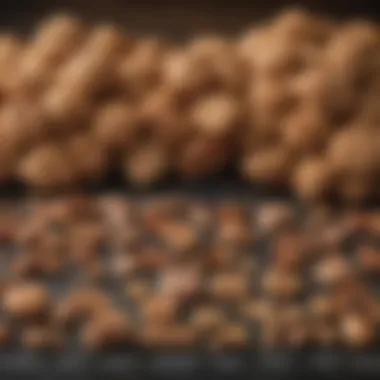Understanding Prolonged Diarrhea: Causes and Health Implications


Intro
Diarrhea in pets is not merely an inconvenience; it is a signal of underlying health issues. While occasional loose stools can happen due to dietary changes or stress, prolonged diarrhea lasting more than a few days raises several flags. This condition not only affects the immediate health of your pet but also can have significant implications on their overall well-being.
Understanding the prolonged impact of diarrhea requires a deep dive into the various causes, whether they originate from infections, dietary changes, or even chronic health disorders. Recognizing these aspects will better prepare pet owners to respond appropriately, seek veterinary help when necessary, and manage their pets' health effectively.
Understanding Your Pet
Breed Traits
Different breeds exhibit varied vulnerabilities to gastrointestinal problems. For example, certain small breeds may have sensitive stomachs, making them more prone to dietary indiscretion. Larger breeds, on the other hand, can face different issues such as bloat which may present similarly to diarrhea. Familiarizing yourself with your pet's breed-specific health tendencies can provide valuable insights into possible causes of diarrhea.
Common Temperaments
The temperament of your pet can influence their health behaviors. Anxiety-prone pets may experience gastrointestinal upset more frequently. Likewise, changes in environment or routine can induce stress leading to diarrhea. Recognizing these behavioral trends aids in managing your pet's mental health while also keeping physical health in check.
Special Needs
Pets with pre-existing health conditions, such as pancreatitis or allergies, require particular attention regarding their diet and lifestyle choices. Owners should closely monitor dietary intake and consult their veterinarians to ensure that all needs are adequately met. This extra layer of care can help prevent gastrointestinal distress and its associated risks.
Pet Care Essentials
Nutrition and Feeding Guidelines
A balanced diet is fundamental for a pet's health. Inappropriate food choices can lead to diarrhea. Ensuring that your pet receives high-quality food appropriate for their age and breed will help support digestive health. Gradually introducing new foods can also minimize risks of upset stomachs.
Grooming Tips and Techniques
Regular grooming, while not directly related to gastrointestinal health, plays a part in overall pet wellness. Keeping your pet clean helps prevent skin infections, which can sometimes accompany other health issues. Bathing and brushing help maintain fur and skin health, contributing to long-term well-being.
Health and Wellness
Routine veterinary check-ups are essential for early detection of diseases that can cause prolonged diarrhea. Vaccinations, parasite control, and regular examinations will keep your pet healthy. Maintaining an open line of communication with your veterinarian can aid in monitoring long-term health trends that could indicate potential problems.
Training and Behavior
Basic Training Techniques
Training contributes to both physical and mental well-being for pets. Basic commands help establish positive behavior, reducing anxiety and stress. This can correlate with better digestive health as stress is a recognized contributor to gastrointestinal upset.
Behavioral Problems and Solutions
Addressing behavioral problems early can mitigate their impact on health, including digestion. For example, if a pet is displaying signs of anxiety that lead to diarrhea, working with a trainer or behaviorist can be beneficial.
Mental Stimulation Activities
Keeping your pet engaged mentally is just as crucial as physical exercise. Dogs and cats require activities that challenge their mind. Puzzles and interactive toys can provide alternatives to boredom that lead to destructive behaviors impacting overall health.
Engaging with Your Pet
Interactive Games and Toys
Incorporating interactive toys into your pet’s routine can significantly enhance their quality of life. These activities reduce anxiety and foster a sense of security. A well-stimulated pet will be less prone to stress-related digestive issues.
Safe Outdoor Activities
Regular outdoor activities are vital. Controlled outings provide physical exercise and mental engagement. However, it is essential to supervise pets closely, ensuring they do not ingest anything harmful that could trigger gastrointestinal distress.
Family-Friendly Pet Interactions
Educating family members about correct interaction with pets can prevent stress for both pets and humans. Ensuring that playtime is gentle and appropriate for the pet's comfort level can lower the chance of anxiety-related issues such as diarrhea.
Pet Adoption and Integration
Choosing the Right Pet for Your Lifestyle
Selecting a pet that matches your lifestyle is fundamental. Consider energy levels, breed characteristics, and health needs. Making an informed choice will prevent future complications, including health problems.
Preparing Your Home for a New Pet


Preparing your environment for a new addition involves more than just buying supplies. It requires creating a safe and welcoming space conducive to a healthy adjustment period. This preparation can prevent stress-induced problems, including diarrhea.
Tips for Smooth Foreword
When introducing a new pet to your home, gradual introductions can help facilitate a smoother transition. Keeping routines consistent and ensuring existing pets feel secure reduces anxiety, enhancing the overall integration process.
Prolonged diarrhea can indicate underlying health issues. Early intervention is key.
By understanding the implications of prolonged diarrhea, pet owners can take proactive steps to support their pets’ health and happiness.
Preface to Prolonged Diarrhea
Diarrhea can significantly impact a pet's health, especially when it lasts more than a few days. In this section, we delve into the nature of prolonged diarrhea, emphasizing its importance in recognizing underlying health issues. Understanding prolonged diarrhea is crucial for pet owners, as it equips them with knowledge to identify when to seek veterinary care.
Defining Diarrhea
Diarrhea is primarily defined as the frequent passage of loose or watery stools. It is not a disease itself but rather a symptom that can arise from various causes. In pets, diarrhea can indicate gastrointestinal distress, dietary issues, or underlying health conditions. A clear definition helps pet owners determine the severity and urgency of their pet's situation.
Pet owners need to understand that not all types of diarrhea are equal. They can be categorized based on duration and consistency, with acute diarrhea being a sudden onset and typically short-lived, while chronic diarrhea lasts longer and may signal a more complex underlying problem.
Signs and Symptoms
Recognizing the signs and symptoms of diarrhea is essential for appropriate management. Symptoms can vary, but common indicators include:
- Frequent stools that are loose or watery
- Straining during bowel movements
- Changes in appetite or behavior
- Vomiting or lethargy
Observation of these symptoms can provide vital clues to the pet owner about their pet's health. If diarrhea persists beyond three days or is accompanied by other concerning signs, seeking veterinary advice is strongly advised. Remember that dehydration can occur quickly in pets suffering from prolonged diarrhea, making prompt intervention even more critical.
Understanding the Duration of Diarrhea
Understanding the duration of diarrhea is crucial for both accurate diagnosis and effective management. Additionally, the distinction between acute and chronic diarrhea influences treatment strategies. Prolonged diarrhea may indicate underlying health issues that can affect your pet's quality of life. Knowing when diarrhea transitions from an acute phase to a chronic state can help pet owners recognize symptoms early, allowing for timely intervention.
Acute vs.
Chronic Diarrhea
Acute diarrhea typically lasts for a short period, usually less than two weeks. It often resolves spontaneously or with minimal treatment. Causes for acute diarrhea can range from dietary indiscretion to infections. In this phase, pets may experience sudden changes in stool consistency and frequency.
Chronic diarrhea, however, persists for longer than two weeks and often requires more in-depth investigation. It may point to serious health issues, including inflammatory bowel disease, allergies, or even certain cancers. Recognizing the difference between these two types lays the foundation for effective treatment. The signs of chronic diarrhea are often subtle. You may notice weight loss or an overall decline in your pet's energy levels.
Key Differences
- Duration: Acute lasts for less than two weeks; chronic persists longer.
- Symptoms: Acute shows sudden change; chronic may present with milder, more persistent symptoms.
- Diagnosis: Acute is often self-limiting; chronic requires professional evaluation.
What Constitutes Prolonged Diarrhea?
Prolonged diarrhea is generally recognized as diarrhea that continues for a week or longer. This condition warrants further evaluation as it exposes pets to risks such as dehydration, nutritional deficits, and significant distress. The pet's usual routine may be disrupted, and overall health can decline. Importantly, prolonged diarrhea can indicate underlying issues that need addressing. Identifying the triggers is essential, as it can help in tailoring a treatment plan.
Pets exhibiting prolonged diarrhea should be monitored closely for additional signs, such as lethargy, loss of appetite, or vomiting. Intervention becomes critical in these cases to avoid complications. A consultation with a veterinarian should occur if diarrhea continues beyond a week or if symptoms worsen.
Potential Causes of Week-Long Diarrhea
Understanding the various potential causes of week-long diarrhea is crucial in this context. Identifying underlying factors can lead to effective management and treatment strategies. In turn, this benefits pet owners by providing clear pathways for intervention. Key considerations include dietary constituents, infectious agents, chronic health conditions, and medication side effects.
Dietary Irritation
Dietary choices significantly influence digestive health. Certain foods can irritate the gastrointestinal system, leading to prolonged diarrhea. Common irritants are high-fat foods, dairy products, and abrupt dietary changes. Such irritations may manifest in symptoms like loose stools and discomfort. Keeping a consistent diet is vital in avoiding these issues. Pet owners should introduce new foods gradually, ensuring that their pets adapt without adverse reactions.
Infections
Infections serve as a common cause of week-long diarrhea in pets. Recognizing the type of infection is key to determining the appropriate course of treatment. There are three primary types of infections: bacterial, viral, and parasitic.
Bacterial Infections
Bacterial infections often result from contaminated food or water. Common pathogens include Salmonella and E. coli. These bacteria produce toxins that disrupt normal intestinal function. The key characteristic of bacterial infections is their ability to spread quickly among pets. Early detection is crucial to prevent severe dehydration. Owners should ensure proper hygiene and food safety to mitigate these risks.
Viral Infections
Viral infections can also lead to prolonged diarrhea. Common culprits include parvovirus and norovirus. These viruses may spread through direct contact with infected animals or contaminated surfaces. One notable aspect of viral infections is their potential to cause systemic illness. This can lead to secondary infections if not treated promptly. Pet owners must be vigilant about vaccination and limited exposure to sick animals.


Parasitic Infections
Parasitic infections, including giardiasis and coccidiosis, are significant contributors to diarrhea. These parasites invade the intestinal lining, causing inflammation and nutrient absorption issues. Their key characteristic is the presence of cysts in contaminated food or water. Managing parasitic infections typically involves veterinary medications, which can effectively eliminate parasites. Regular deworming in pets can prevent such infections from becoming a persistent issue.
Chronic Health Conditions
Chronic health conditions are another important consideration. Certain diseases can predispose pets to prolonged diarrhea. Common conditions include inflammatory bowel disease, hyperthyroidism, and cancers. Understanding these conditions is vital for owners who observe ongoing gastrointestinal issues in their pets.
Inflammatory Bowel Disease
Inflammatory bowel disease (IBD) is characterized by chronic inflammation of the digestive tract. This condition is essential to understand because it leads to nutrient malabsorption and persistent diarrhea. Owners should note symptoms such as vomiting or weight loss. A veterinary diagnosis is important to manage IBD properly. This often involves dietary management and medication to reduce inflammation.
Hyperthyroidism
Hyperthyroidism results from excessive thyroid hormone production, affecting various bodily systems, including digestion. A key feature of this condition is weight loss despite a normal or increased appetite. Understanding hyperthyroidism's impact on dietary needs helps in adjusted feeding plans. Consistent monitoring and veterinary care can effectively manage this condition and improve a pet's overall health.
Cancers
Cancers, particularly those affecting the gastrointestinal tract, can also lead to prolonged diarrhea. These cancers may be difficult to diagnose in early stages. Key characteristics include abnormal weight loss, lethargy, and fluid buildup in the abdomen. Understanding the implications of cancer allows for timely intervention. Treatments vary widely but often require a multidisciplinary approach involving specialists.
Medication and Treatment Side Effects
Medications can lead to side effects, including diarrhea. Antibiotics and non-steroidal anti-inflammatory drugs are common examples. It is crucial for pet owners to be aware of the specified side effects of prescribed medications. Maintaining communication with veterinarians can help manage any adverse reactions effectively. Adjusting dosages or switching medications may be necessary to alleviate these symptoms.
Assessing the Severity of Diarrhea
Assessing the severity of diarrhea is crucial in understanding the overall health implications on pets. This section aims to equip pet owners with the knowledge to identify key symptoms that dictate the seriousness of a prolonged diarrhea case. Knowing how to evaluate these symptoms can lead to timely intervention, which can be vital for the animal's well-being.
Classifying Symptoms
Hydration Levels
Hydration levels are one of the most important indicators when assessing the severity of diarrhea. When pets experience prolonged diarrhea, they can quickly become dehydrated. A key characteristic to observe is the pet's skin elasticity. By gently pinching the skin on the back of the neck and releasing it, you can notice how fast it returns to its original position. If it takes longer than usual, this is a sign of dehydration.
This topic is especially beneficial for owners, as early recognition of dehydration can lead to preventive actions, such as increasing fluid intake. The unique feature of monitoring hydration levels is that it can often be done at home. However, pet owners should be careful; severe dehydration needs immediate veterinary attention.
Fever Presence
Fever presence is another significant aspect of the assessment process. A raised body temperature often indicates a response to infection or inflammation. Monitoring the pet's temperature can help in determining if there is an underlying illness contributing to the diarrhea. The normal temperature for pets usually ranges from 100.5°F to 102.5°F.
This characteristic is helpful because it allows pet owners to evaluate the situation more effectively. However, measuring fever requires a rectal thermometer, which some pets may not tolerate well. If fever persists alongside diarrhea, it warrants professional evaluation.
Blood in Stool
Blood in stool is a critical symptom that significantly influences the assessment of diarrhea severity. It can indicate serious conditions, such as internal bleeding or severe infections. The presence of blood may be a key factor for determining if immediate veterinary care is necessary.
This symptom is vital since it not only affects the urgency of the situation but also points toward potential illnesses that need prompt treatment. However, distinguishing between minor and severe cases can be complex, as not all instances of blood in stool indicate an emergency. Therefore, careful observation is needed in such situations.
When to See a Veterinarian
Determining when to seek veterinarian help is a significant aspect of assessing diarrhea. Understanding the severity based on hydration levels, fever, and any presence of blood can guide owners in making informed decisions. Prolonged diarrhea, especially when accompanied by these serious symptoms, should not be overlooked. Seeking timely medical advice can be pivotal in ensuring the best health outcomes for pets.
Impact of Prolonged Diarrhea on Pets
Prolonged diarrhea in pets is not a trivial situation; it presents a variety of risks that can affect their overall health and well-being. Understanding this impact is essential for pet owners to safeguard their companions. When diarrhea lasts for a week or more, the potential for nutritional deficiencies and dehydration concerns becomes significantly more pronounced. Awareness enables proactive management and ensures that pets receive the necessary care.
Nutritional Deficiencies
When pets experience prolonged diarrhea, it can lead to significant nutritional deficiencies. Diarrhea hinders the body's ability to absorb vital nutrients from food. Each episode can cause the loss of essential vitamins and minerals, resulting in various health problems. Key nutrients at risk include:
- Electrolytes: Sodium, potassium, and chloride are critical for bodily functions, and their depletion can lead to severe complications.
- Vitamins: Water-soluble vitamins like B and C are particularly susceptible during digestive issues.
- Proteins: Protein-energy malnutrition may occur in pets because their bodies cannot digest and absorb adequate protein during bouts of diarrhea.
Pets might show signs of weight loss, lethargy, or even behavioral changes as their nutritional state deteriorates. Providing a balanced, digestible diet during recovery can help mitigate these deficiencies. Consulting with a veterinarian about dietary adjustments is prudent to ensure that pets can regain their nutritional balance.
Dehydration Concerns
Dehydration is one of the most serious consequences of prolonged diarrhea. When pets have frequent loose stools, they lose significant amounts of water. This loss can quickly lead to dehydration, which poses risks to vital organs and overall health. Recognizing the signs of dehydration is critical. These signs include:
- Dry gums and mucous membranes
- Lethargy or decreased energy levels
- Reduced appetite
- Sunken eyes


In severe cases, dehydration may culminate in shock or even death if left untreated. Continuous access to fresh water is a must, along with electrolyte solutions designed for pets, which can help replenish lost fluids. Keeping a close eye on hydration levels can make a significant difference in recovery.
Understanding the risks of prolonged diarrhea allows pet owners to make informed decisions about their animals' health.
Managing the implications of prolonged diarrhea requires diligence and swift action. Being aware of the nutritional and dehydration consequences can enhance a pet owner's approach to care, ensuring a more secure recovery process for their pets.
Management Strategies for Week-Long Diarrhea
Prolonged diarrhea can lead to numerous health complications in pets. Therefore, implementing effective management strategies is vital. This section explores various approaches to address and alleviate the symptoms of week-long diarrhea. These strategies not only help in immediate symptom management but also in promoting long-term health benefits for pets.
Dietary Adjustments
When dealing with prolonged diarrhea, dietary adjustments are an essential part of management. The right types of food can minimize irritation in the gastrointestinal tract. A bland diet often works best during this period. Typical recommendations include boiled chicken without skin and white rice. These foods are gentle and less likely to provoke further digestive issues.
It is also critical to eliminate any potential triggers from the diet. Foods rich in fat, dairy, or artificial additives should be avoided. Gradually reintroducing regular food can establish which items are safe for your pet.
- Tips for dietary adjustments:
- Maintain a consistent feeding schedule.
- Monitor portion sizes to avoid overloading the digestive system.
- Introduce probiotics, which can restore gut flora.
Hydration Techniques
Dehydration is a significant concern with prolonged diarrhea. Dehydration can severely impact a pet's health if not adequately addressed. Ensuring that your pet stays hydrated is fundamental. Always provide fresh, clean water. Additionally, consider offering electrolyte solutions formulated for pets. These solutions help replenish lost fluids and electrolytes.
Another effective method is offering bland broth. Chicken or beef broth without salt can entice pets to drink more. For pets who are less inclined to drink, using a syringe to administer fluids directly might be necessary, but this should be done cautiously to avoid choking.
Ensuring proper hydration can prevent severe complications such as kidney damage and shock.
To effectively monitor hydration levels, check for signs such as dry gums, lethargy, or reduced skin elasticity. If you notice any of these symptoms, it is crucial to consult a veterinarian.
Medications and Treatments
Pharmaceutical interventions may sometimes be required for managing prolonged diarrhea. Over-the-counter medications such as loperamide can help in certain cases. However, it is essential to consult a veterinarian before administering any medication. Some medications may not be suitable for all pets and could even exacerbate the condition.
For cases linked to infections or parasites, specific antibiotics or antiparasitic treatments may be necessary. These should only be prescribed by a veterinarian after a thorough examination and diagnosis.
- Considerations for medication:
- Always read labels and follow dosing instructions carefully.
- Monitor for side effects, and report any unusual behavior to your vet.
- Keep a close eye on the pet's general condition and recovery process.
Preventive Measures
Preventive measures play a crucial role in managing and reducing the risk of prolonged diarrhea in pets. Ensuring the health of pets should involve proactive actions. This not only helps in early identification of potential health issues but also minimizes the likelihood of complications resulting from diarrhea.
Regular Health Check-ups
Regular health check-ups are an essential component of preventive care for pets. They enable veterinarians to monitor the overall health of an animal, ensuring that any emerging issues are addressed promptly. A veterinary check-up may include a physical examination, vaccinations, and sometimes, diagnostic tests. These assessments allow for early detection of underlying health problems that might contribute to diarrhea, such as infections or chronic diseases.
Through these visits, pet owners can gain guidance on how to maintain their pet's health, including dietary recommendations and preventive treatments, ultimately leading to improved overall well-being and reducing the chances of future diarrhea episodes.
Appropriate Diet Selection
Choosing the right diet for pets is vital in preventing gastrointestinal issues. A balanced and nutritious diet can significantly influence a pet's digestive health. Pet owners should select high-quality foods, taking into account the specific nutritional needs of their animals.
It is also important to introduce new foods gradually to avoid gastrointestinal upset. Understanding food sensitivities or allergies is key. Monitoring pets’ reactions to dietary changes or specific ingredients can help identify potential triggers of diarrhea. Educating oneself about the ingredients present in pet food can lead to more informed choices that support digestive health.
Taking proactive measures like regular check-ups and selecting appropriate diets can greatly enhance your pet's health and quality of life.
End
The assessment of prolonged diarrhea in pets carries significant importance within this article. Understanding the underlying causes and implications is essential for pet owners. This comprehension allows for more impactful measures when it comes to managing a pet's health. It opens avenues for early intervention, which can be critical in avoiding serious health issues. Moreover, it sheds light on how to navigate potential dietary or medical changes effectively.
Recap of Key Points
In this article, we have explored various dimensions of prolonged diarrhea. Here are the central themes that were discussed:
- Definition and Classification: We distinguished between acute and chronic diarrhea and established what precisely constitutes prolonged diarrhea.
- Potential Causes: We identified factors ranging from dietary irritations to infections and chronic health conditions that can lead to prolonged symptoms.
- Assessment of Severity: The evaluation of symptoms based on hydration, fever, and even the presence of blood in stool was emphasized.
- Impact on Health: The implications of prolonged diarrhea on pets, particularly in the context of nutritional deficiencies and dehydration, were discussed.
- Management Strategies: Various approaches to manage and mitigate symptoms, including dietary adjustments and hydration techniques, were evaluated.
- Preventive Measures: Regular health check-ups and suitable diet selections were highlighted as crucial for prevention.
Final Recommendations
To conclude, it is imperative for pet owners to stay vigilant in observing their pets' health. If diarrhea persists for more than a few days, seeking veterinary advice is necessary. Early diagnosis can lead to more effective management of the underlying causes. Here are some recommendations to consider:
- Monitor Symptoms Closely: Keep a detailed record of symptoms for your veterinarian.
- Hydrate Effectively: Ensure your pet remains hydrated, especially during episodes of diarrhea. Electrolyte solutions can be beneficial.
- Dietary Re-evaluation: Reflect on any recent dietary changes that may have triggered the diarrhea.
- Regular Check-ups: Schedule regular veterinary visits to catch potential health issues early.
Taking proactive steps will not only help address immediate concerns but also contribute to the long-term health and well-being of your pet.



